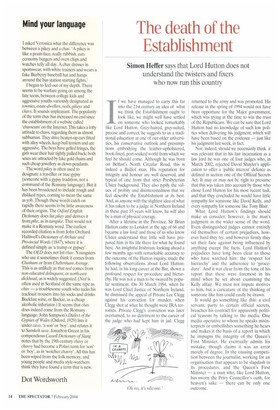Mind your language
I asked Veronica what the difference was between a pikey and a chav. 'A pikey is like a pram-face, really rubbish, eats economy burgers and oven chips and watches telly all day. A chav dresses in sportswear, with white trainers and wears a fake Burberry baseball hat and hangs around the bus station starting fights.'
I began to feel out of my depth. There seems to be warfare going on among the late teens, between college kids and aggressive youths variously designated as townies, estate-dwellers, neds, pikeys and chavs. It sounds unpleasant. The popularity of the term chav has increased no end since the establishment of a website called `chavscum' on the Internet. This takes a lofty attitude to chavs, regarding them as almost subhuman. They drive beaten-up cats fitted with alloy wheels, keep bull terriers and are aggressive. The boys have gelled fringes, the girls wear their hair tightly pulled back; both sexes are attracted by fake gold chains and such cheap jewellery as clown pendants.
The word pikey is often used to designate a traveller or true gypsy (someone with a gypsy tradition, not a command of the Romany language). But it has been broadened to include rough and disliked types, coming to mean the same as yob. Though these words catch on rapidly there seems to be little awareness of their origins. The (Word English Dictionary does list pikey and derives it from pike, as in turnpike. That would not make it a Romany word. The earliest recorded citation is from John Orchard Halliwell's Dictionary of Archaic and Provincial Words (1847), where it is defined simply as 'a tramp or gypsey'.
The OED does not list chav. Youngsters who use it sometimes think it comes from Chatham or from Cheltenham Average. This is as unlikely as that nal comes from non-educated delinquent, or north-east dickhead, as is widely suggested. (Ned is often used in Scotland of the same type as chav — a troublesome youth who tucks his tracksuit trousers into his socks and drinks Buckfast wine, or Bucicie, as a cheap alcoholic infuriator.) It seems that chav does indeed come from the Romany language, John Sampson's Dialect of the Gypsies of Wales (Oxford, 1929) lists it under cavo, 'a son' or 'boy', and relates it to Sanskrit sava. Jonathon Green in his compendious Cassell Dictionary of Slang notes that by the 19th century chavy or chavty had become a Polari term for 'son' or 'boy', as in 'wotcher chavvy'. All this has been wiped from the folk memory, and young people and media style-watchers think they have found a term that is new.
Dot Wordsworth


























































 Previous page
Previous page